- Home
- Various Authors
The Conan Compendium Page 15
The Conan Compendium Read online
Page 15
"Ah," said Conan, and then, a moment later, "All right." He did his best to make himself believe it was.
"If you want to be useful, you can cut up these turnips and parsnips and onions for the stew ―and chop up this head of cabbage, too ―not too fine, mind you, or it will cook too fast when I put it in," said his mother.
"Of course," said Conan. As the knife tore through the vegetables, he wished it were tearing through Count Stercus' flesh instead. He imagined blood spurting from every cut, not colorless turnip juice. The picture pleased him, so much that he sliced harder than ever.
"Easy, easy," said Verina. 'These are not heads to be set above the doorposts of our house, you know. No need for murder here."
"Oh, but there is," said Conan. "If ever a man wanted killing, that damned Aquilonian is the one."
"I doubt he's any worse than the rest of them," said Verina.
"He is," insisted Conan. "The way he sniffs around ― around this village is nothing but a disgrace." He felt uncomfortable mentioning Tarla to his mother.
She understood what he was talking about even when he did not talk about it.
With a toss of the head, she answered, "That one is a little hussy. If she weren't, the accursed Aquilonian wouldn't keep sniffing around her. I don't know why you worry about her. She isn't good enough for you."
Conan started chopping the vegetables even more savagely than before. His mother did not think anyone was good enough for him. Conan did not know what he thought. He only knew that, as he passed from boy to man, he cared less with each new day that went by whether a girl was good enough for him. Whether she was interested in him ―that was another story, and one in which he had a burning interest.
"But don't mind me," said Verina. "After I'm dead and gone, you and your father will settle things to your own liking, I'm sure." She began to cough again, softly but steadily.
"Here. Drink some water, Mother." Conan hurried to dip some out of the jar and into a mug. He handed it to his mother and stood over her until she did drink. Not so long before, she had been taller than he; he remembered those days very well.
Now he towered over her. Before too long, he would overtop his father, too. That was a truly dizzying thought. No one in Duthil could match Mordec's inches.
Mordec came back into the kitchen from the smithy, as if thinking of him were enough to conjure him up. Sweat ran down his fire-reddened face and forearms, washing clean rills through the soot that covered them. "I could do with some water, too, son," he rasped. "Fetch me a cup, if you'd be so kind."
"Aye, Father." Conan found a larger mug and dipped it full.
"My thanks." Mordec drained it in one long draught. Then he went to the water jar himself. He filled the mug again. Instead of drinking from it, he poured it over his head. "Ahhh!" he said: a long exhalation of pleasure. Water ran through his hair, ran through his beard, and dripped from the end of his nose.
"There you go, making part of my kitchen floor into mud," said Verina shrilly. As in the smithy, the floor here was only of rammed earth. When it got wet, it did turn muddy.
But Conan's father only shrugged. "Give it a little while and it will dry, Verina,"
he said. "As for me, though, I needed that, by Crom. I'm surprised I didn't hiss like hot iron quenched when I poured it over me."
"Did you see Count Stercus today, Father?" asked Conan.
Mordec's mouth thinned to a narrow line. "I saw him, all right. What if I did?"
Conan scowled blackly. "Is that not the face of a man who deserves death?"
"I've seen men I liked better at first glance," answered his father. "But my guess is, where he looks bothers you more than how he looks."
That shaft hit unpleasantly close to the center of the target. Conan flushed so hot that he longed for a mug of water to cool him. Stubborn as always, he said, "He's got no business here."
"He thinks otherwise," said Mordec.
"Well, I think he can ― " But Conan broke off. He could not say what he wanted Count Stercus to do, not with his mother listening. He growled in frustration, down deep in his throat.
"What happens to him does not first depend on what you think," said his father.
"We've been over this ground before. It depends on what Balarg thinks. He is the girl's father, after all." Verina tossed her head once more. Mordec took no notice of her.
"Why doesn't Balarg do something, then?" cried Conan.
His father frowned. "By now, I wish he would do more myself. And I wish Tarla would stop preening every time she sets eyes on the Aquilonian noble. Balarg should speak to her about that. But the world is as it is. It is not the way we wish it were. I suppose that's why Crom isn't the sort of god who makes a habit of granting prayers."
However earnestly he spoke, Conan hardly heard him. Mordec had presumed to criticize Tarla, which only served to infuriate his son. As far as Conan was concerned, Tarla could do no wrong―this despite the fact that she did not care to speak to him and showed Stercus far more sweetness, just as Mordec had said.
Verina started to cough again. Conan scarcely noticed even that sound, which most of the time roused nothing but dread in him.
Mordec guided Verina back to the bedchamber. A glum frown on his heavy-featured face, the blacksmith returned to the kitchen and finished the supper his wife had begun.
At harvest time, almost everything in Duthil stopped. Even folk who did not farm went into the fields to help bring in the oats and rye. The ripe grain had to come in before bad weather could spoil it. On it depended the hopes of the village through the winter and into the following spring.
Conan and Mordec both swung scythes whose blades the blacksmith had forged.
So did Balarg. Along with the other women of Duthil, Tarla helped gather the golden grain into sheaves. The Aquilonian soldiers watched the work from their encampment not far away. None of them came out to help the Cimmerians. The first autumn they had been here, and even the second, they had tried to join the villagers. Everyone in Duthil had pretended they did not exist. By now, the invaders had learned their lesson: they might be here, but they were not welcome.
Mordec stood up straight. He grunted and twisted and rubbed at the small of his back. "This is not my proper trade," he grumbled, "and every year my bones tell me so louder and louder." Conan worked on tirelessly. He might have been powered by the water that would turn the grindstones in the mill to make the grain into flour. With his fourteenth winter approaching, aches in the bones were as far from him as gray hair and a walking stick.
Like all the villagers, he did pause ever so often to glance anxiously up toward the sky. Mist and clouds floated across it even at high summer, and high summer was a long way behind them now. Rain at harvest time would be disastrous. Hail would be even worse. Hail at harvest time might mean old men and women and young children would never see another spring. As Mordec had said, Crom did not answer prayers, but more than a few went his way at this season even so.
Bend. Swing the scythe. Watch the grain fall. Straighten. Take a step forward.
Bend. Swing again. That was Conan's life from first light of dawn until the last evening twilight leaked from the sky. Almost all the men in Duthil, and the boys old enough to do their fair share, took part; the chief exception was Nectan the shepherd, who did not leave his flock even for the harvest.
When the men came back to the village, the}' wolfed down food and ale, then fell into bed and slept like the dead. When morning came, they would munch oatcakes or porridge, then stuff more oatcakes and perhaps some cheese into their belt pouches and lurch out to the grainfields for another day's backbreaking labor.
At last, only a few gleaners were left in the fields, gathering up the last heads of grain the main harvest had missed. And then, with only stubble and dirt remaining, Duthil took one of its rare days of rest. Instead of rising before sunup, men ― and women ―slept late. When at last they rose, they did only the most essential things. Whatever was not essential would
wait. A lot of families, Conan's among them, did heat water for baths, which had gone by the wayside along with so much else during the work-filled chaos of harvest time.
After the day of rest came a day of celebration. By age-old custom, the folk of Cimmeria celebrated whether the harvest was good or bad. If it was good, they celebrated because it deserved celebrating. If it was bad, they celebrated to cast defiance in the face of fate. Chickens stewed. Ducks and geese roasted, with thrift)' housewives carefully catching the drippings. Slaughtered hogs turned on spits over trenches full of fire. Casks and jars of ale were broached.
Like any Cimmerian, Conan had been drinking ale since he stopped drinking his mother's milk. It was more filling and often more wholesome than water. He rarely drank to excess. A couple of thick heads had made him wary of that.
Today, though, he recklessly poured down the ale, hoping to borrow enough courage from it to say some of the things he wanted to say to Tarla.
He had not said them by midafternoon, when Count Stercus rode into Duthil. The Aquilonian noble sat astride his charger and, unusually, led a pack horse with several stout casks tied to its back. Spotting Conan's father in the crowd of strangers, he pointed to him and spoke in Aquilonian, no doubt to make himself seem more important: "Translate for me, my good man."
Mordec nodded. "Say what you will."
"Tell your people I heard they would feast today. Tell them also that no feast is a true feast without wine." Stercus pointed to the pack horse. "I have brought your enough to prove the point."
He could not have bought himself popularity, or even toleration, with silver or with gold. Wine proved another story. The Cimmerians drank it when they could get it; Aquilonian traders had made it known in this land where no vineyard could
prosper. But so much of the strong, sweet brew at harvest time ―yes, sly Stercus had known what coin to spend.
And if he made sure Tarla drank several beakers of the red blood of the grape, if he laughed by her when her walk went clumsy and her speech got slurred, if he whirled her in a sprightly Aquilonian dance when pipes and drums began to play, who could hold it against him? No one at all ―no one but Conan the blacksmith's son, who found himself upstaged again.
Chapter Nine
For Stercus Sake?
Rhiderch the seer stayed in and around Duthil through the winter. He made himself useful now and again. Balarg's wife had lost a silver ring―work of the ^£sir―and Rhiderch told her to slaughter a certain hen. Sure enough, she found it in the bird's gizzard. It must have slipped from her finger while she was scattering grain for her chickens. She valued the ring enough to feed the seer for a week afterwards ― and she was not one usually given to fits of generosity.
And Rhiderch also found four sheep that had wandered away from Nectan during a snowstorm that covered their tracks as fast as they were made. He told the shepherd to look by a red rock beneath a tall spruce. Nectan knew a reddish boulder just in from the edge of the forest that fit the bill. When he went to the rock, there were the sheep. He gave Nectan one of them, reckoning it better to have three back than to have lost them all.
The seer's powers came and went. They did not always serve him as he would have wished. He also did odd jobs to keep himself fed and sheltered. Except for his erratic gift, he did nothing better than everyone else. But he did a lot of things better than most people, and so found ways to make himself useful.
One morning in early spring, Conan came upon him repairing the wall of a neighbor's house. Wherever he had learned to work with wattle and daub, he took pains to do a proper job, using plenty of sticks and twigs to anchor the mud.
Nodding to the blacksmith's son, he said, "A good day to you. Next I'll put more
thatch on the roof, to keep the rain from dripping through and marring the wall again."
"That will keep the house sound, sure enough." Conan hesitated, then asked, "How do you see what you see?"
Rhiderch did him the courtesy of taking the question seriously. "I know not, lad,"
he answered. "All I know is that I see. Sometimes it will be as clear as if it were before my eyes, the way I see you now. Sometimes what I see will mean nothing or next to nothing to me, yet seem plain enough to the person to whom I tell it.
And sometimes neither I nor he will know what a vision means."
"When you see something, are you ever wrong?" asked Conan.
"Wrong?" Again, Rhiderch paused to think before replying. "Well, as I say, there are times when I cannot tell you what will come from things I have seen. But that's not what you meant, is it?" Conan shook his head. Rhiderch thought a little longer, then said, "No, I don't believe I see falsely. If a meaning comes of it, it is the meaning I have seen."
"So it seemed to me," said Conan. "Tell me, then: what do you see about our folk and the Aquilonians?"
"So far, I have not seen anything, not in the way you mean," replied Rhiderch.
"Could you?" asked Conan eagerly.
"Could I bring on a vision instead of waiting for one to strike me?" The seer frowned. "I know not. I do not believe I have ever tried. For most visions, I would not try."
"But this one is important to all our people," protested Conan.
"Well, so it is," admitted Rhiderch. "All right, lad. I'll give it a go. Let no one say I fought shy of doing what we Cimmerians need."
He stood there at the edge of Duthil's main street: a lean old man with long, clever hands filthy from mud. His lips moved, at first silently and then in a soft, droning chant. Awe prickled through Conan. He realized the seer was gathering his mental powers to pierce the veil of the unknown as a sharp awl might pierce thick, resistant leather. Rhiderch's eyes met Conan's, but the blacksmith's son did not think the other man truly saw him. Whatever Rhiderch saw, it was not the little village where Conan had lived all his life.
The seer suddenly went stiff. His eyes opened very wide, so that white showed all around their irises. "Crom!" he muttered, whether calling on the grim northern god or simply in astonishment Conan could not have said. In a voice that might have come from the other side of the grave, Rhiderch went on, "Gore and guts and grief and glory! War and woe and fire and flame! Death and doom and dire deeds! War, aye, war to the knife, war without mercy, war without pity, battle till the last falls still fighting!"
Conan shuddered. He had got more in the way of a vision than he had bargained for. Rhiderch twitched like a man in the throes of an epileptic fit. Hoarsely, Conan asked, "But who will win?" Nothing else mattered to him. "Who will win?"
Now Rhiderch's gaze thrust through him like a sword. "War and woe!" repeated the seer. "Duthil dies a dismal death. The golden lion― ' He twitched again.
"Aye, the golden lion flaps above your head."
"No!" howled Conan, a long wail of misery. Bitterly he repented of his own curiosity. Repentance, as usual, came too late. "No! Let it not be so! Tell me not that accursed Aquilonia triumphs."
Rhiderch blinked several times. Only after the fact did Conan notice the seer's eyes had stayed open every moment while he was prophesying. With reason on his face once more, Rhiderch inquired, "What said I?"
"You do not know?" exclaimed Conan. Rhiderch shook his head. Although he had manifestly returned to the mundane plane, he still seemed pale and drawn, as though he had just shaken off a nearly killing fever. As best Conan could, he recounted Rhiderch's baleful words.
The seer heard him out in silence. Rhiderch looked down at the daub on his hands as if it were dripping blood. "I know not what to say to you, lad," he said at last, "save this alone: the foretelling and the event are not the same. The event is the thing, the foretelling but a shadow. Like any shadow, it shifts and grows and shrinks in response to the light that casts it."
"Cold comfort, by Crom!" jeered Conan. "You have seen my village dead. How shall the shadow of that shift? You are nothing but a stinking carrion crow with corpse meat in your mouth!"
Rhiderch bowed his head. "If you blame the messenger f
or the message, strike now," he said.
Instead of striking, Conan swore. He spun on his heel and stormed out of Duthil.
Slaying Rhiderch would solve nothing, for how could he slay the seer's words?
They would echo inside him until the unfolding of time revealed their fulfillment―and he was all too sure it would. Rhiderch had been a man inspired; however shadowy his words might have been, he had spoken truth.
Air spicy with the sap of conifers surrounded Conan as he rushed into the woods.
Leaving behind the stinks of Duthil ― the dung, the animals, the smoke, the unbathed bodies, the tanning hides ―was easy. Leaving behind Rhiderch's prophecy came harder. That followed Conan: indeed, try as he would, he took it with him. Escape was what he wanted most, and what he could not have.
A raven croaked at him from a tall spruce. He shook his fist at the big, black bird.
"Begone, cruel corbie!" he cried. "You'll not take the flesh from my bones to feed your nestlings." He stooped to pick up a stone.
Wise and wary in the ways of men, the raven leaped into the air with a great rustle of wings. Conan hurled the stone anyway, as much from sheer rage as for any other reason. It just grazed the outermost feather on the raven's left wing. The bird gave another hoarse cry and vanished into the forest.
"And take your ill-luck with you, accursed thing!" shouted Conan after it. The
woods seemed to swallow his words. He wondered if they reached the raven. He could only hope. Had curses stuck as readily as they were given, all the Aquilonians would long since have vanished from Cimmeria.
Conan realized he had only an eating knife at his belt, for he had rushed out of the village in a passion, with not the slightest thought for what he would do next.

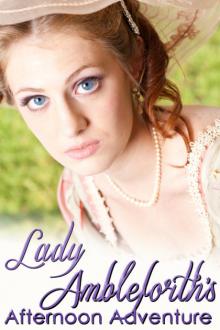 Lady Ambleforth's Afternoon Adventure by Ann Lethbridge, Barbara Monajem, Annie Burrows, Elaine Golden, Julia Justiss and Louise Allen
Lady Ambleforth's Afternoon Adventure by Ann Lethbridge, Barbara Monajem, Annie Burrows, Elaine Golden, Julia Justiss and Louise Allen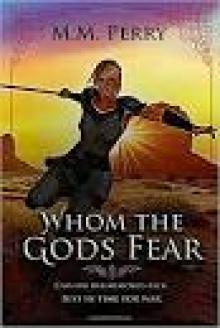 Gods & Mortals
Gods & Mortals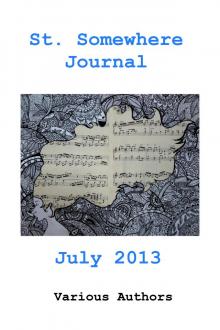 St. Somewhere Journal, July 2013
St. Somewhere Journal, July 2013 firstwriter.com First Short Story Anthology
firstwriter.com First Short Story Anthology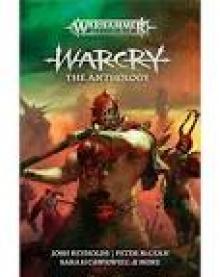 Warcry: The Anthology
Warcry: The Anthology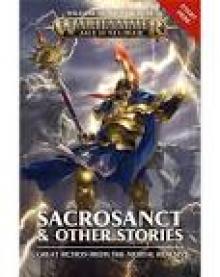 Sacrosanct & Other Stories
Sacrosanct & Other Stories Ultimate Heroes Collection
Ultimate Heroes Collection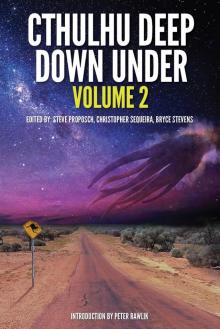 Cthulhu Deep Down Under Volume 2
Cthulhu Deep Down Under Volume 2 Erotic Classics II
Erotic Classics II Dynasties: The Elliotts, Books 1-6
Dynasties: The Elliotts, Books 1-6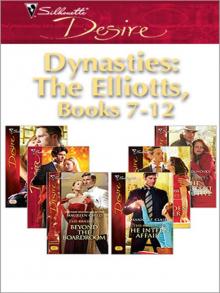 Dynasties:The Elliots, Books 7-12
Dynasties:The Elliots, Books 7-12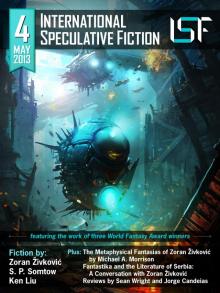 International Speculative Fiction #4
International Speculative Fiction #4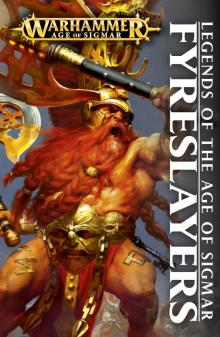 Fyreslayers
Fyreslayers One Night In Collection
One Night In Collection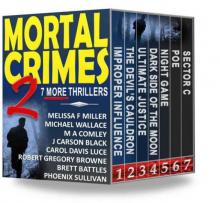 Mortal Crimes 2
Mortal Crimes 2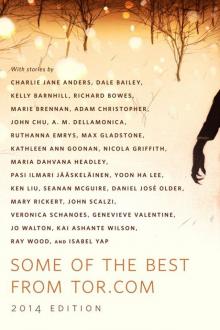 Some of the Best from Tor.com
Some of the Best from Tor.com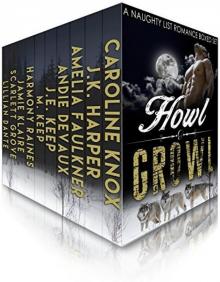 Howl & Growl: A Paranormal Romance Boxed Set
Howl & Growl: A Paranormal Romance Boxed Set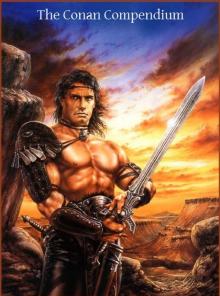 The Conan Compendium
The Conan Compendium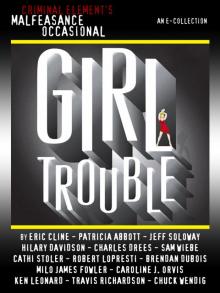 The Malfeasance Occasional
The Malfeasance Occasional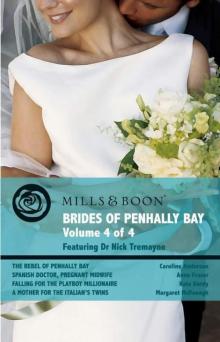 Brides of Penhally Bay - Vol 4
Brides of Penhally Bay - Vol 4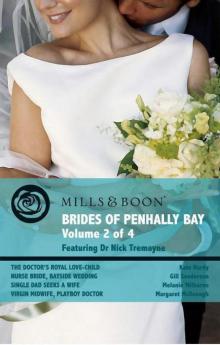 Brides of Penhally Bay - Vol 2
Brides of Penhally Bay - Vol 2 Brides of Penhally Bay - Vol 1
Brides of Penhally Bay - Vol 1 School's in Session
School's in Session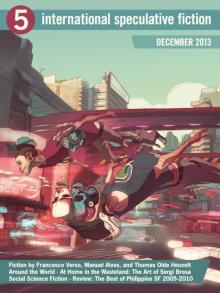 International Speculative Fiction #5
International Speculative Fiction #5 Erotic Classics I
Erotic Classics I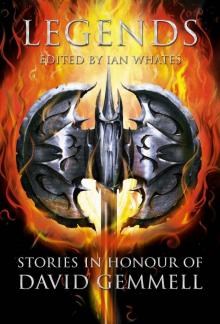 Legends: Stories in Honor of David Gemmell
Legends: Stories in Honor of David Gemmell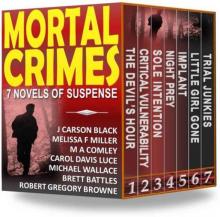 Mortal Crimes 1
Mortal Crimes 1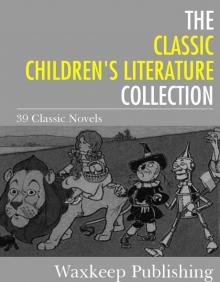 The Classic Children's Literature Collection: 39 Classic Novels
The Classic Children's Literature Collection: 39 Classic Novels Don't Read in the Closet volume one
Don't Read in the Closet volume one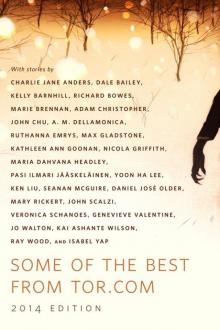 Some of the Best from Tor.com: 2014: A Tor.Com Original
Some of the Best from Tor.com: 2014: A Tor.Com Original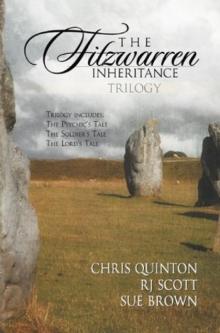 The Fitzwarren Inheritance
The Fitzwarren Inheritance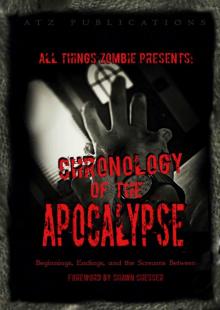 All Things Zombie: Chronology of the Apocalypse
All Things Zombie: Chronology of the Apocalypse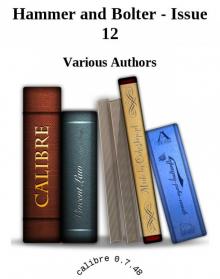 Hammer and Bolter - Issue 12
Hammer and Bolter - Issue 12 Kiss Kiss
Kiss Kiss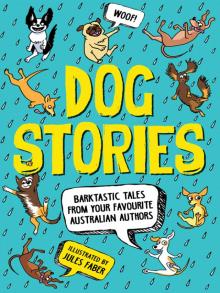 Dog Stories
Dog Stories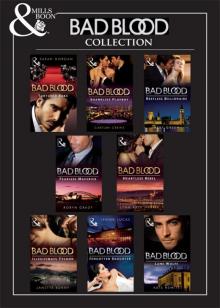 Bad Blood Collection
Bad Blood Collection